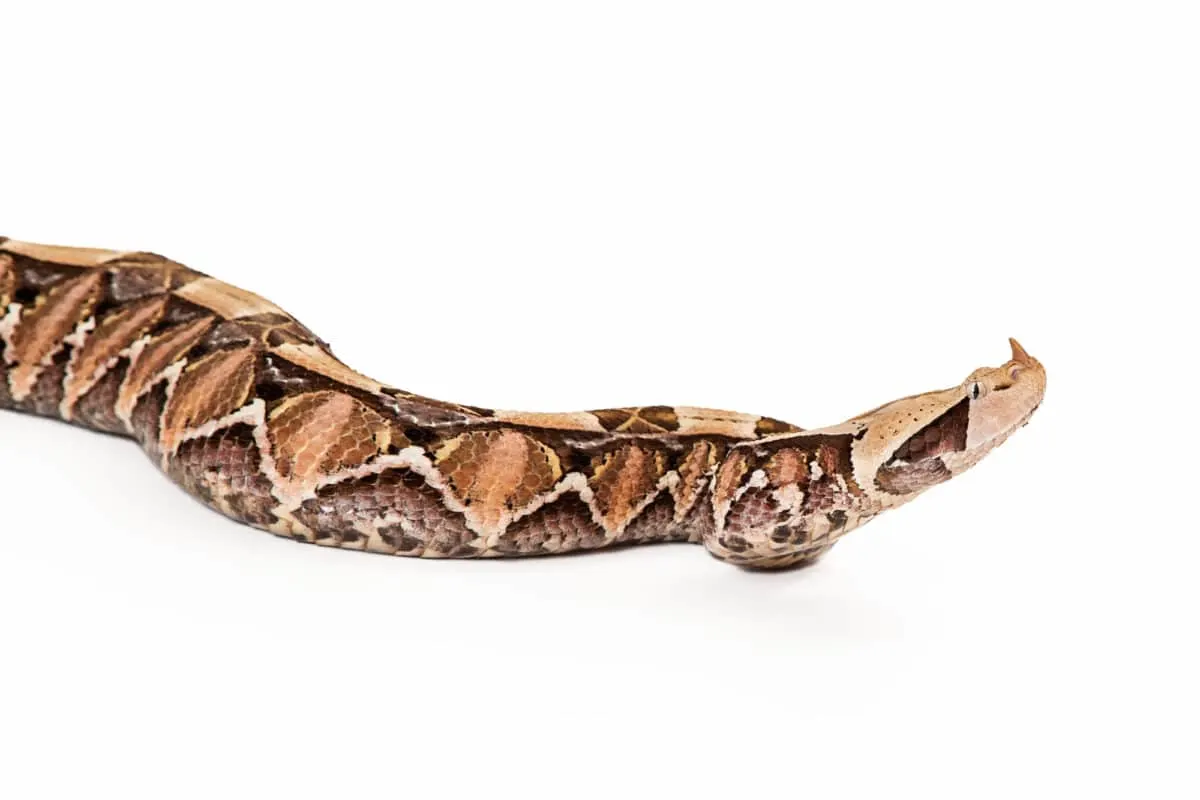Have you ever heard about the serpent species, the Gaboon viper? If not, this is the ultimate guide to surviving a Gaboon Viper Bite!
This remarkable snake is well known for its extraordinary characteristics – from its beautiful coloring to its deadly venom. Want to compare with another viper? Let’s look at The Fer-De-Lance Pit Viper Bite.
Want to compare with another viper? Let’s look at Habu Pit Viper Bite.
Want to compare with another viper? Let’s look at The Temple Viper Bite.
Not only does it look impressive, but a bite from this viper can be lethal if not given swift and correct medical attention.
Let’s explore what makes the Gaboon viper so dangerous and how to respond if someone has been bitten.
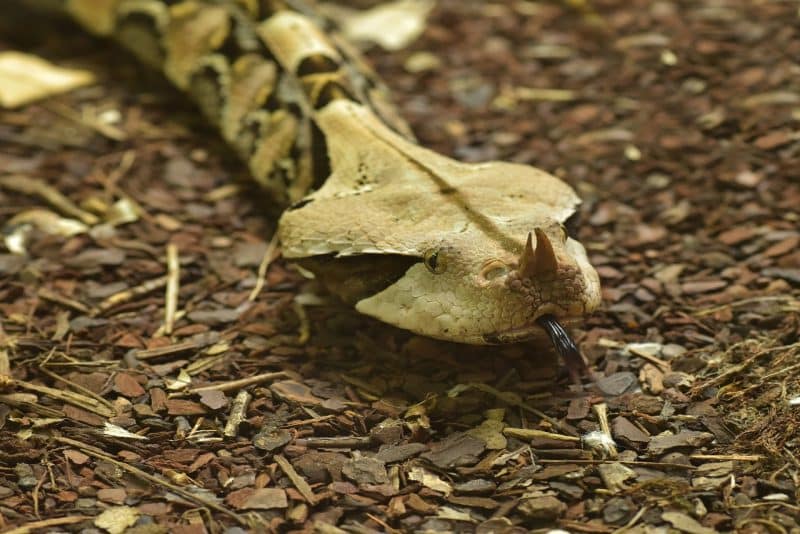
Want to jump ahead? Click below
Identifying Gaboon Viper Bites – Symptoms And Warning Signs

Gaboon vipers are stunning creatures that are feared for their deadly venom. If you encounter a Gaboon viper or know someone bitten, it’s important to be familiar with the symptoms and warning signs of a bite.
Below are the key indicators that you should be aware of:
Indications Of Gaboon Viper Bites
- Pain
A Gaboon viper bite can cause intense pain at the site of the bite. The intensity of discomfort may differ based on where the bite occurred and the quantity of venom that entered the body.
- Swelling And Redness
The region surrounding the bite can experience inflammation, reddening, and elevated temperature upon contact. It can quickly spread and cause significant inflammation.
- Nausea And Vomiting
Some people may experience nausea, vomiting, or both, especially if more venom is injected.
- Breathing Difficulties
In severe cases or when bitten in the chest or neck, a person may have difficulty breathing or experience shortness of breath.
- Blurred Vision
Vision may become blurry, and the pupil may become dilated if the venom affects the nervous system.
Also, check out: Sydney Funnel-Web Spider Bite
Warning Signs Of Gaboon Viper Bites
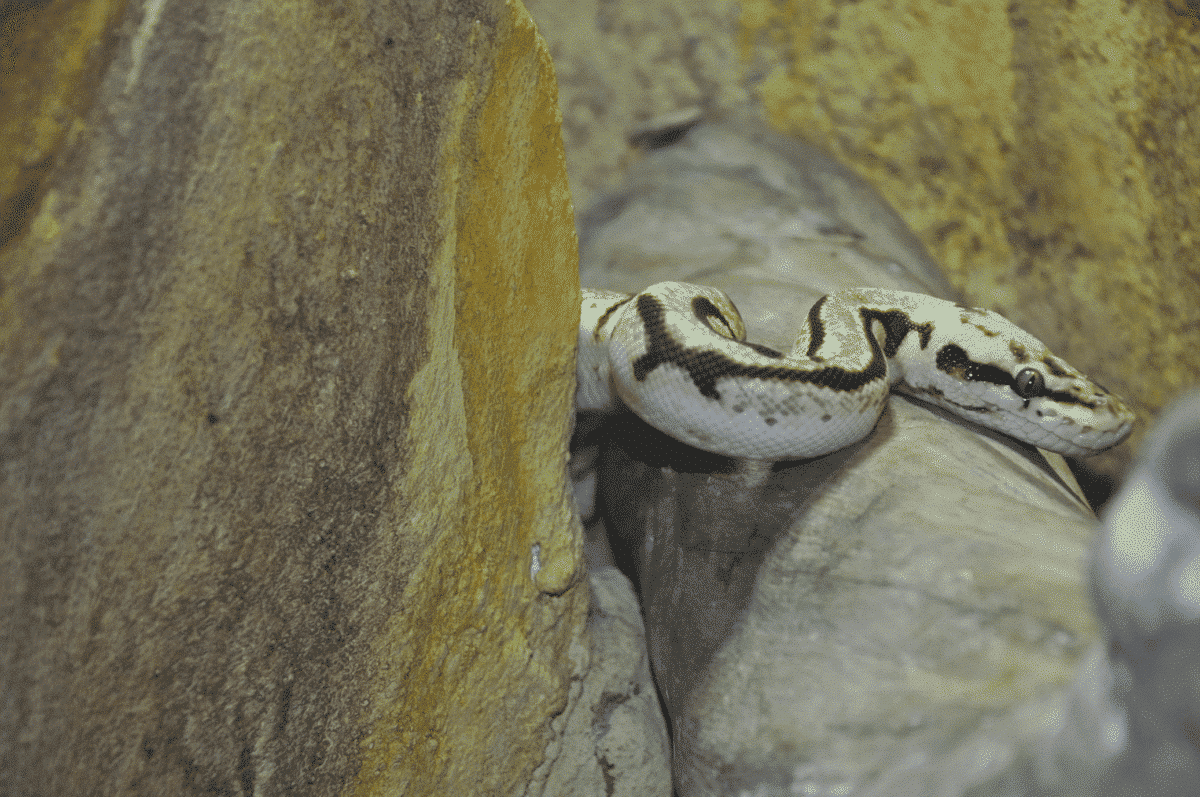
- Two Fang Marks
Gaboon vipers have two long fangs; their bites usually leave two puncture wounds close together.
- Unusual Bleeding
Gaboon viper venom can affect blood clotting and cause unusual bleeding from the wound.
- Shock
A person bitten by a Gaboon viper may experience signs of shock, such as a rapid heartbeat, low blood pressure, and pale skin.
- Convulsions Or Seizures
In severe cases, the venom can cause strokes or seizures.
What To Do If A Gaboon Viper Bites Someone

- Seek Medical Attention
Gaboon viper bites are medical emergencies, and immediate medical attention is necessary. Summon assistance and convey the affected individual to the closest hospital.
- Keep The Person Calm
Encourage the Person to stay calm and slow the venom’s spread.
- Remove Constrictive Clothing
Take off any attire or accessories that could constrain blood circulation in the event of swelling.
- Don’t Cut Or Suck The Wound
It’s a common misconception that cutting the wound or sucking out the venom can help treat a bite. However, this can make the situation worse.
Recognizing the symptoms and warning signs of a Gaboon viper bite can save lives. If you or someone you are familiar with is bitten, seek medical attention immediately and keep the victim relaxed and comfortable until help arrives.
What To Do Immediately After Being Bitten
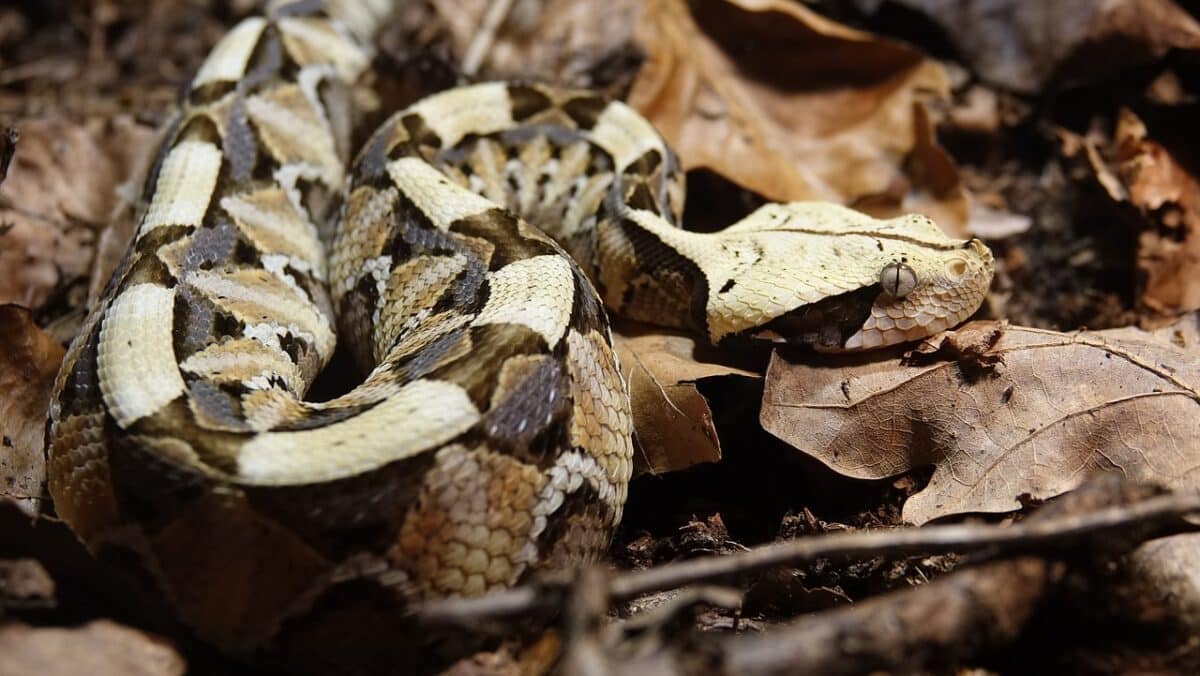
A bite from a Gaboon viper is a serious matter that requires immediate attention. As soon as you realize you have been bitten, the first step is to stay calm and keep the affected area as still and elevated as possible.
Quickly seek medical attention from a healthcare facility with venom management expertise. It is advisable to refrain from attempting to suck out the venom or excising the affected area since it could result in further harm rather than benefit.
The healthcare provider will administer anti-venom medication and monitor the patient’s vital signs for several days. Ensure the healthcare team is updated with as much information as possible about what transpired before and after the bite.
Adhering to these measures could enhance the possibility of a favorable recuperation from a Gaboon Viper bite.
Check out Gaboon viper envenomation: An unexpected injury by non-indigenous snake in South Korea.
Seeking Medical Attention And Treatment
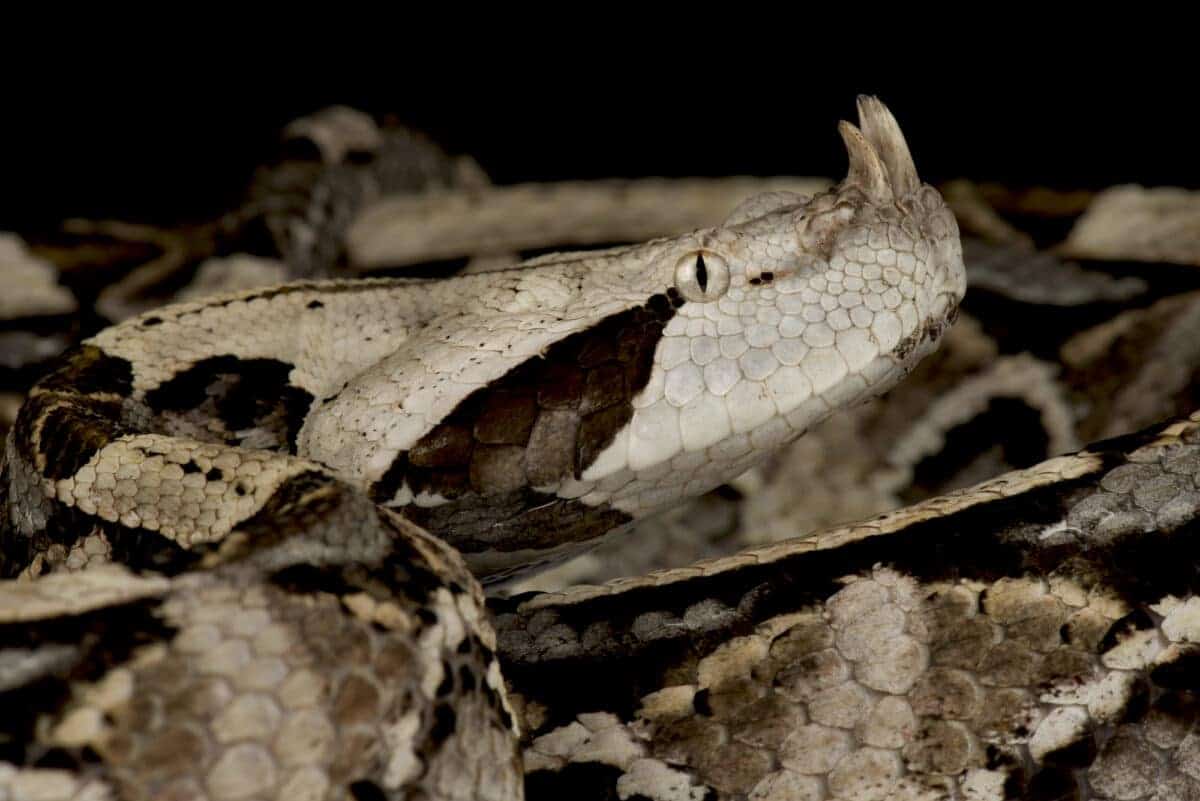
- Firstly, Gaboon viper bites should always be treated as a medical emergency.
- Secondly, if you know someone familiar who has been bitten by a Gaboon viper, seeking immediate medical attention is crucial.
- Thirdly, the venom from this snake can cause severe pain, swelling, and tissue damage and even be fatal in some cases.
- Treatment may include administering anti-venom, pain medication, and wound care.
- Anti-venom is the most effective treatment for a Gaboon viper bite and can significantly reduce the risk of complications.
- It’s important to seek treatment as soon as possible after being bitten, as the longer you wait, the more damage the venom can cause.
How To Prevent A Bite From Happening Again
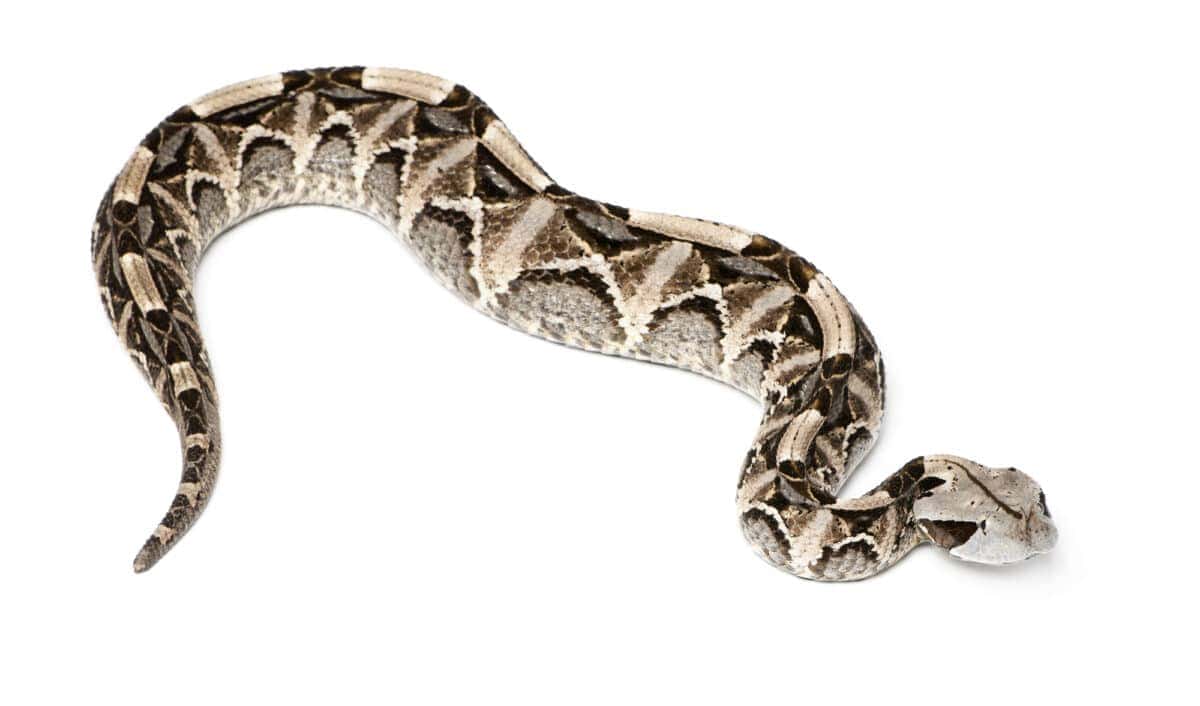
- Also, check out: Yellow-Bellied Sea Snake Bite
The best way to prevent a Gaboon viper bite is to avoid contact with the snake altogether.
- These snakes are primarily found in the forests and savannas of Africa and are not typically aggressive towards humans unless provoked.
- Thirdly, if you must be in an area where Gaboon vipers are present, it’s important to stay alert and watch for any signs of the snakes.
- Wear protective clothing and footwear, such as long pants and boots, and avoid walking through tall grass or brush where snakes could be hiding.
- It’s important to be cautious when exploring new areas, as Gaboon vipers can be difficult to spot and may blend in with their surroundings.
- Lastly, to safely deal with a Gaboon viper, it is recommended that you slowly back away and provide the snake with ample space to retreat.
Learn more about First Aid for Central African Gaboon Viper Snake Bite.
Natural Remedies For Pain Relief
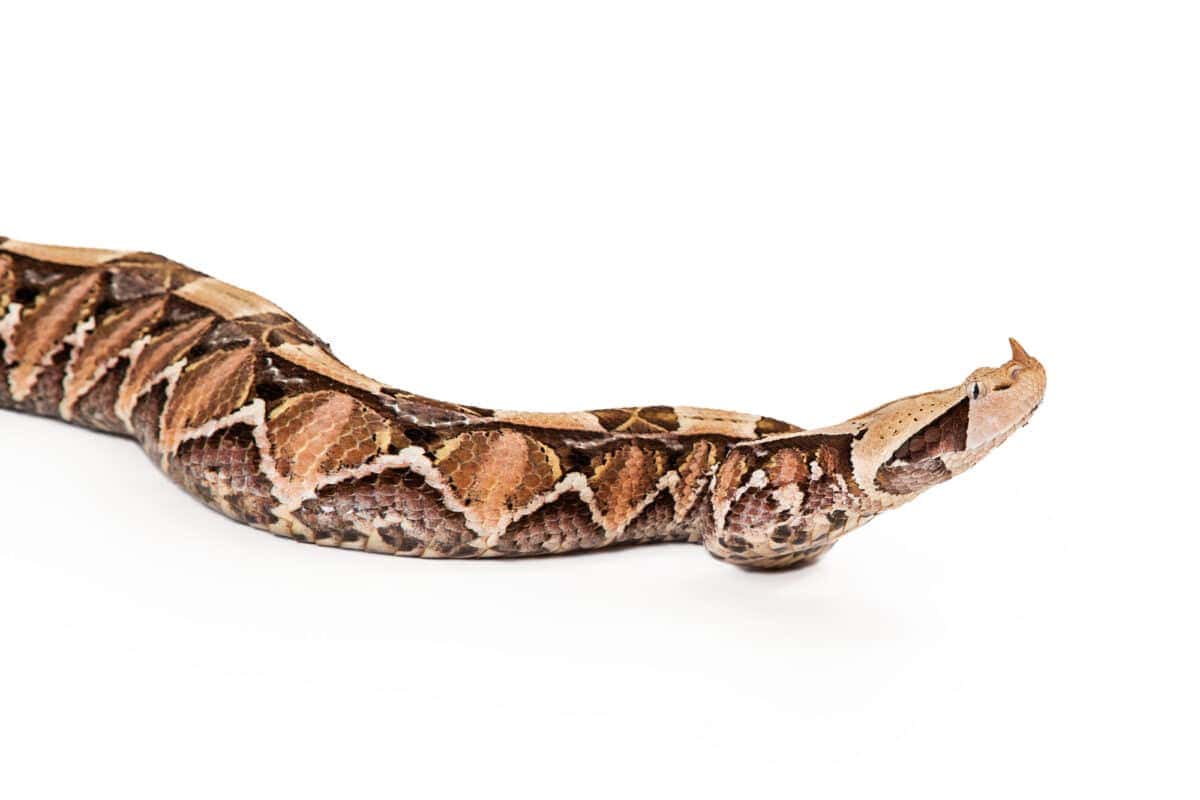
- Firstly, if you’re experiencing pain or discomfort after a Gaboon viper bite, several natural remedies may help provide relief.
- It’s recommended to apply a cold compress to the impacted region. To alleviate swelling and pain, over-the-counter pain medication, such as ibuprofen or acetaminophen, can aid in pain management.
- Resting and elevating the affected limb can also contribute to the reduction of swelling and promote healing.
- Certain essential oils, such as lavender or peppermint, may benefit some people with pain relief and relaxation.
Tips On Dealing With Anxiety Related To The Bite

- Being bitten by a Gaboon viper can be a traumatic experience, and it’s common to experience anxiety and fear following the incident.
- Secondly, it’s important to seek support from friends and family and consider contacting a mental health professional if you struggle to cope.
- Focus on the positives and celebrate any progress you make during your recovery.
- It’s advisable to utilize relaxation techniques, such as deep breathing or meditation manage anxiety and foster a sense of tranquillity,
- Lastly, it’s important to exercise patience with oneself and acknowledge that recovery takes time. Furthermore, with appropriate medical care and support, most individuals bitten by a Gaboon viper can achieve full recovery.
Key Points

| Gaboon vipers are stunning creatures that are feared for their deadly venom. These snakes are primarily found in the forests and savannas of Africa and are not typically aggressive toward humans unless provoked. If you must be in an area where Gaboon vipers are present, it’s essential to stay alert and watch for any signs of the snakes. |
| A Gaboon viper bite can cause intense pain at the site of the bite. The degree of pain can vary depending on the location of the edge and how much venom was injected. |
| The area around the bite may become swollen, red, and warm to the touch. It can quickly spread and cause significant inflammation. |
| It’s recommended to apply a cold compress to the impacted region. To alleviate swelling and pain, over-the-counter pain medication, such as ibuprofen or acetaminophen, can aid in pain management. |
| Recognizing the symptoms and warning signs of a Gaboon viper bite can save lives. If you or someone you are familiar with is bitten, seek medical attention immediately and keep the victim relaxed and comfortable until help arrives. |
Wrapping Up Gaboon Viper Bite
We hope this guideline has given you a greater understanding of the Gaboon viper and how it’s important to take precautions if encountered. This deadly creature can be intriguing and beautiful, but it’s wise to remember how dangerous it truly is.
Whether seeking out more information or planning a venom antidote kit, being aware of the Gaboon viper is key for staying safe in any environment these formidable snakes inhabit.
If you ever encounter such a situation or know someone who does, don’t panic – seek medical help immediately. Educate yourself and your family about this incredible creature so everyone can safely appreciate its beauty without getting too close!
Thanks for following along with me! I hope you enjoyed reading about these two entertaining animals. Next are King Cobra Bites, Gorilla versus Crocodile, and Gorilla versus Cobra.
- The Blue Whale Is The Loudest Animal - October 20, 2024
- Fishermen Rescue Fawn Treading Water - October 20, 2024
- Discover The Largest Carnivores In The World - October 20, 2024

